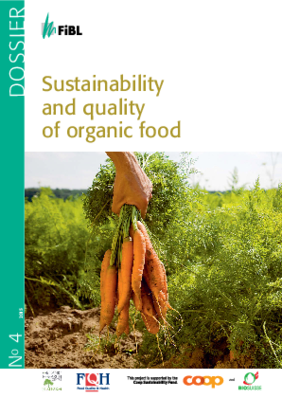(Frick, 19.5.2015) Organic food should be tasty, healthy, environmentally friendly and produced in a fair manner. The high expectations on the products make it clear that the quality of food cannot be reduced to individual criteria, but must include the entire process from production to the plate.
In the new edition of the dossier "Sustainability and quality of organic food" FiBL’s Regula Bickel and Raphaël Rossier illuminate the various aspects that contribute to the quality of food. The 28-page review describes a contemporary, holistic concept for the evaluation of food quality. The differences between organic and conventional food are examined and clearly documented with examples, based on selected aspects and current knowledge. The authors explain the sometimes complex issues in an easily comprehensible manner.
Fewer additives in organic dried apricots
One of the examples used is organic dried apricots. They are usually of brown to black colour and at first glance seem unappetizing, but their taste can compete with conventional apricots. The colour difference is due to the absence of sulphite in organic dried apricots. This preservative prevents the colour change in conventional apricots and protects them against fungi and bacteria. But as dried fruits are already well preserved without additional preservatives, the addition of sulphite is not necessary. In organic products this food additive is therefore prohibited. The result is high-quality dried apricots, containing fewer additives and thus more natural than conventional ones.
The English language edition of the dossier has been undertaken in co-operation with the Organic Research Centre, with translation by Anja Vieweger and financial support from the Sheepdrove Trust gratefully acknowledged.
Further information
Contact
- Regula Bickel
- Raphaël Rossier
The dossier can be downloaded at www.organicresearchcentre.com.
For UK and Ireland, printed copies (GBP 6 each) can be ordered from elmfarm(at)organicresearchcentre.com, or from The Organic Research Centre, Hamstead Marshall, Newbury, RG20 0HR, UK. (Online ordering and payment will be available shortly).
For other countries, printed copies are available from FIBL. The dossier is also available in German and French at the FiBL-Shop.




